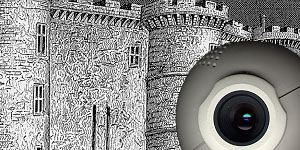


For Your Eyes Only
During the First World War, Gilbert Vernam, an AT&T (American Telephone and Telegraph) employee, was asked to invent an encryption method that the Germans couldn't break. He did one better---he came up with an encryption scheme that no one could break.His method, the only provably secure encryption scheme known, is called a one-time pad: a long stream of random letters used to modify the message, one letter at a time. Both the sender and the receiver must have a copy of the pad. And both work through it in lockstep, letter by letter, never reusing any.
To use it, the sender goes through the message letter by letter and modifies each new letter using the next letter in the pad. The receiver then does the same thing, reversing the modification to extract the original message. Each letter in the pad is used to change exactly one letter in the message, then thrown away.
For example, here's a one-time pad translation of a message into a secret message:
Plaintext: hellodear Key: axybcyvwm Secret: icknrcaveEach letter of the pad modifies exactly one letter of the message. An a in the pad means to turn the corresponding letter of the message into the next letter down in alphabetical order; a b means to turn the corresponding letter into the second letter down in alphabetical order; and so on. Any such scheme will do, once the pad's letters are random.
The encrypted message is now unbreakable because letter assignments vary randomly and continuously. So attackers can't use a statistical analysis to recover any information at all. For example, they can't find the most frequent letter then assume that it must correspond to e, as Sherlock Holmes did with the dancing men, because every e in the secret message could have turned into a different letter.
So the secret message 'icknrcave' could have come from any nine-letter sequence at all. It could just as easily be 'hellodear' as it could be 'selldrugs' or 'eeeeeeeee' or any one of the over five million million nine-letter messages. So even Holmes would be completely baffled.
Allegedly, highly sensitive channels like the Washington-Moscow hotline use a computerized one-time pad. Unfortunately, a one-time pad usually isn't practical for everyday use since it has to be as long as all messages ever sent using it. And since the pad's letters are random and must remain secret, it must be sent over a secure channel. But if we had a truly secure channel able to take lots of traffic, why bother encrypting the information in the first place? For instance, during the Second World War, Hitler confided many military secrets to the Japanese Ambassador to Berlin, who dutifully sent them on to his superiors in Tokyo. But what neither he nor Der Fuehrer knew was that the Americans had broken the Japanese diplomatic system in 1940. So the ambassador unwittingly became the main source of Allied information about Hitler's intentions in Europe. The conclusion bears repeating: Overreliance on supposedly secure channels is a bad idea.
Even counting one-time pads, there are no secure encryption schemes, only secure enough ones. No encryption scheme is unbreakable just as no building is unenterable---even if it's the White House or Buckingham Palace. We can always get in if we have enough time and money.
So just as we don't spend a million dollars to secure a hundred thousand dollar home, we don't use unbreakable encryption schemes to protect our grocery lists. We usually choose secrecy systems that are hard to break only while the information would be useful, and within a cost related to how important the information is.
So a nation wishing to send encrypted press releases to its embassies for release next week, for example, may choose a system that can resist attack for a month. But it wouldn't use such a system to protect state secrets for thirty years. All information needs to be secret only for a certain time anyway, which is why so many famous people write scandalous autobiographies when they retire. In the long run we're all dead.